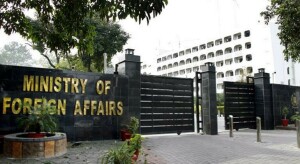ISLAMABAD: The Supreme Court declared that under Article 175 (3) of the Constitution, the courts martial and the forum of appeal under the Pakistan Army Act, 1952, have no jurisdiction to prosecute persons accused of clause (d) of the Act.
Justice Jamal Khan Mandokhail on Friday issued his verdict on the intra-court appeals against the Supreme Court judgment on military courts.
A seven-judge Constitutional Bench of the Supreme Court, headed by Justice Aminuddin Khan, and comprising Justice Jamal Khan Mandokhail, Justice Muhammad Ali Mazhar, Justice Syed Hasan Azhar Rizvi, Justice Musarrat Hilali, Justice Naeem Akhtar Afghan and Justice Shahid Bilal Hassan on May 7 by majority of 5-2 had set aside the SC judgment and restored Section 2 (1) (d) and Section 59 (4) of Pakistan Army Act, 1952.
The majority had referred the matter to the government/ parliament for considering and making necessary amendments/ legislation in the Army Act, and allied Rules for providing an independent right of appeal in the High Court, against the conviction awarded to the persons by the court martial/military courts, within a period of 45 days.
Two members of the Constitutional Bench, namely, Justice Mandokhail and Justice Naeem, disagreed with the majority judgment, and set aside the convictions and sentences awarded to civilians by the courts martial for 9th May 2023, incidents, and declared them to be without jurisdiction.
Justice Mandokhail judgment said that the jurisdiction to try civilians extended to courts martial, especially, in the light of the judgment of FB Ali ceases to exist. The discretion of “prescribed officer” assigned to him by virtue of Section 94 of the PAA relating to transfer of cases of civilians to courts martial, in respect of civil offences under clause (d), is no more available. However, the courts martial have a limited jurisdiction to the extent of prosecuting members of the Armed Forces for violation of military laws and civil offences.
It said that the logic behind the separation of the judiciary from the executive, under Article 175 of the Constitution, is that criminal offences are against the State, whereas, the executive is responsible for administration of the same. A person who breaches a law, is an accused of the State, therefore, the executive having an interest into the matter, cannot itself perform as a judge to punish the accused. It is for this reason, sub-Article (3) of Article 175 of the Constitution mandates that the judiciary shall be separated from the executive, within 14 years of commencement of the Constitution.
The judgment noted that upon insertion of clause (d) in subsection (1) of Section 2 and subsection (4) in Section 59 of the Pakistan Army Act (PAA), the courts martial comprising serving officers of the Army are prosecuting the persons accused of offences of clause (d).
It said that the purpose of adding the said clause in the PAA is that the offences mentioned therein are prejudicial to the interests of the Army. Admittedly, it is a fundamental principle of natural justice that no one ought to be a judge in his own cause or in which he has an interest.
This principle is strictly observed to avoid any instance of bias, resulting into injustice. Under such circumstances, the courts martial and the forum of appeal under the PAA, manned or run by the executive, under the command, control and discipline of the Federal Government, cannot be regarded as unbiased, independent or impartial forums. They cannot protect the fundamental rights and liberties of citizens in a criminal charge or for the determination of their rights and obligations. Thus, courts martial and the forum of appeal are violative of Articles 2A, 175 (3) and 227 of the Constitution.
The judgment held that the courts martial are administered judicially, not as a part of the judicature erected under Article 175 of the Constitution, but as part of the organisation of the Armed Forces itself. The jurisdiction of courts martial trying military personnel for service offences and civil offences is different from judicial power exercised by ordinary courts for the general offences against the State.
The judgment said: “We have no doubt in our minds that being a special legal framework, the PAA is primarily a disciplinary statute that applies exclusively to a specified group of people; i.e., members of the Armed Forces.”
Copyright Business Recorder, 2025






















Comments
Comments are closed.